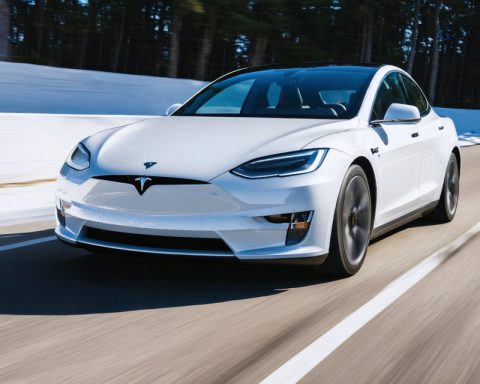The Rise and Risks of Major Tech Stocks
The landscape of American technology is dominated by a group known as the Magnificent Seven. This includes renowned giants like Alphabet, Amazon, Apple, Meta, Microsoft, Nvidia, and Tesla. These companies have experienced unprecedented stock price growth over the last two years, collectively constituting more than a third of the S&P 500 index, which is composed of 500 firms.
This remarkable concentration of market value is unlike anything observed in past financial history. Investment experts express concern that if these behemoths face challenges with their aggressive investments in artificial intelligence, the repercussions could ripple through the entire market. A significant downturn could influence consumer and corporate spending alike, profoundly affecting the economy.
While echoes of past market crashes may arise, it’s crucial to note that these companies are currently profitable, showcasing robust financial health. Investors are hoping that advances in AI will drive future growth, though some analysts caution against expecting rapid changes. The progress of technological revolutions often unfolds more slowly than anticipated.
The evolution of the internet serves as a reminder that major shifts in technology take time to integrate into everyday life. As anticipation for artificial intelligence builds, the question remains: will these seven powerhouses sustain their remarkable performance, or will they face unforeseen hurdles? The path ahead is both promising and uncertain.
The Rise and Risks of Major Tech Stocks
The surge of the Magnificent Seven—Alphabet, Amazon, Apple, Meta, Microsoft, Nvidia, and Tesla—reflects not only a remarkable phase in stock market performance but also raises significant questions about the interconnections between technology, the economy, and our future on this planet. While these companies drive innovation and economic growth, they also pose risks that could echo through environmental and societal spheres.
One of the most pressing concerns stemming from the dominance of these tech giants is their environmental impact. Each company contributes to carbon emissions in different ways—be it through data centers, the manufacture of electronic devices, or supply chain logistics. For instance, Nvidia and Tesla are at the forefront of the electric vehicle (EV) revolution, promising cleaner transport solutions. Yet, the production processes involved, particularly related to lithium-ion batteries, and the sourcing of raw materials can often lead to environmental degradation if not managed sustainably. The broader implications for humanity hinge on our ability to hold these companies accountable to green standards and reduce their carbon footprint.
Simultaneously, the financial performance of these corporations has global economic ramifications. With a third of the S&P 500 index being tied to such a concentrated sector, instability among these tech stocks can lead to significant market downturns. A possible scenario of stock volatility not only jeopardizes the wealth of individual investors but risks a cascading effect on global economies, impacting employment rates, consumer confidence, and public spending. For the average citizen, much of the economic buoyancy hinges on the health of such corporate entities.
Moreover, as artificial intelligence develops, it presents both opportunities and ethical dilemmas for the future of humanity. If successfully integrated, AI can enhance productivity and solve complex issues, from climate change to healthcare challenges. Conversely, the same technology poses job displacement risks, as automation replaces human labor. How society navigates this delicate balance between technological advancement and societal welfare will determine the quality of future employment landscapes as well as global inequalities.
The interconnectedness of these technological behemoths extends to how they influence public perception and policy around technology. With a stronghold on media and communication platforms, companies like Meta and Alphabet drive conversations about technology’s role in society. This power impels them to engage actively in dialogues about privacy, digital ethics, and societal impacts, underlining the need for a regulatory framework that promotes both innovation and responsibility.
In summary, the trajectory of these major tech stocks carries profound implications for the environment, economic stability, and humanity’s future. The success or failure of this sector can dramatically shape our societal landscape, paving the way for sustainable practices or exacerbating existing challenges, including climate change and socioeconomic divisions. As we look forward, it is imperative that we hold both corporate giants and policymakers accountable to ensure that technological advancement translates to a healthier planet and a more equitable society for generations to come.
The Magnificent Seven: Future-Proofing Your Investments in Tech Stocks
The Rise and Risks of Major Tech Stocks
The American tech industry is significantly influenced by a select group of companies known as the Magnificent Seven: Alphabet, Amazon, Apple, Meta, Microsoft, Nvidia, and Tesla. These businesses have not only shown a remarkable increase in stock performance over the past couple of years, but they also represent a significant portion of the S&P 500 index, comprising over one-third of its total market capitalization.
Market Concentration: A Double-Edged Sword
This extensive concentration of wealth in a few tech giants is unprecedented. While it indicates strong market performance, it also signals potential risks. Experts fear that if any of these companies encounter difficulties—particularly amidst aggressive investments in artificial intelligence (AI)—the effects could cascade through the broader market. A downturn in this sector could significantly impact consumer and corporate expenditures, thereby affecting the overall economy.
Profitability and Growth Potential
Unlike prior economic downturns, the Magnificent Seven are currently displaying strong profitable metrics, which may cushion them against volatility. The potential for growth driven by advancements in AI is a focal point for numerous investors; however, market analysts urge caution. Historical patterns suggest that revolutionary technology adoption is often more gradual than initial projections.
The AI Impact: Predictions and Trends
The anticipated influence of AI on these companies is enormous, but the timeline for transformation remains uncertain. Historical parallels, such as the slow integration of the internet into daily business and personal life, underline the fact that while advancements in technology can set the stage for growth, actual implementation and adaptation take considerable time.
Use Cases and Applications of AI
Different sectors within these tech giants are likely to harness AI in various innovative manners:
– Healthcare: Companies like Apple and Microsoft are exploring how AI can enhance telemedicine and patient data analysis.
– E-commerce: Amazon is leveraging AI for inventory management and personalized shopping experiences.
– Financial Services: Alphabet and Meta are looking at AI to improve advertising efficiency and customer engagement.
Pros and Cons of Investing in Tech Giants
Pros:
– Strong Financial Performance: Many of these companies have proven their resilience and profitability.
– Innovative Potential: Continuous investment in AI and other emerging technologies could drive future growth.
– Market Share: They dominate key technological markets, providing a certain economic moat.
Cons:
– Market Volatility: High levels of concentration may lead to increased instability.
– Dependency on AI Growth: Results may not meet expectations, leading to a recalibration of stock valuations.
– Regulatory Risks: Increased scrutiny from regulators regarding antitrust practices can affect operations.
Security and Sustainability Considerations
As these firms expand their influence, security and ethical practices become paramount. Data privacy and the ethical implications of AI usage are subjects of ongoing debate. Moreover, sustainability initiatives are gaining traction, with tech companies being called upon to address environmental impacts related to their operations and product lifecycles.
Conclusion: What Lies Ahead?
The future for the Magnificent Seven remains a topic of intrigue and speculation. While the current track shows promise with AI at the forefront of innovation, the uncertainties surrounding economic resilience and technological adaptation pose significant questions. Investors should remain vigilant, staying informed about market dynamics and potential technological shifts.
Stay Informed
For more insights into tech investments and market trends, visit Forbes for continuous updates and analyses on this evolving landscape.

















